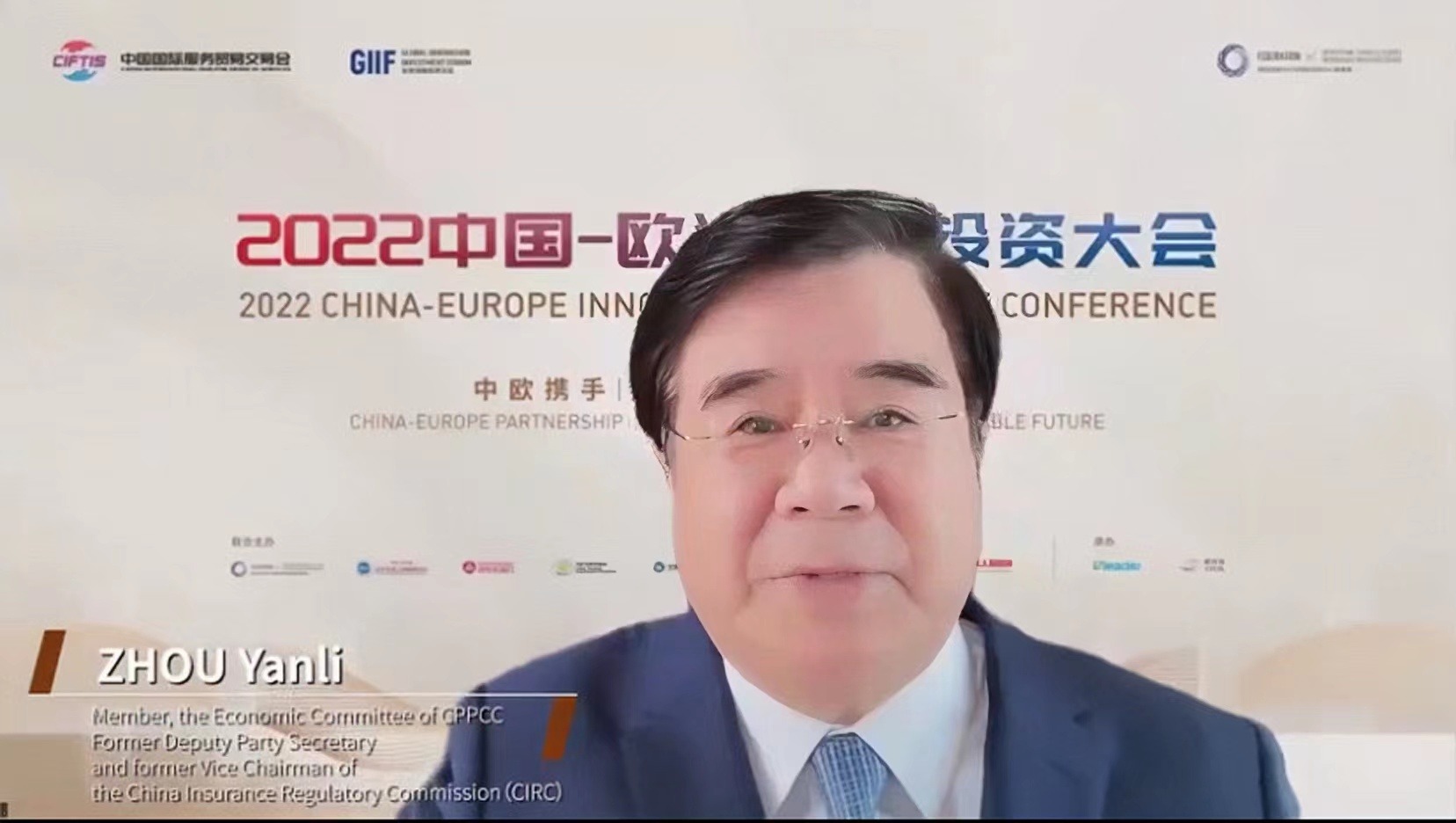

China-EU financial industry cooperation has made great progress
Close China-EU financial cooperation contributes to the development ofChina-EU economy and trade
Despite the impact of the epidemic, anti-globalization and economic downturn, China-EU economic and trade cooperation manifests strong resilience. In 2021, bilateral trade exceeded $820 billion. China maintains its position as the EU’s largest trading partner in goods. EU is China’s second largest trading partner in goods. The cumulative scale of two-way investment has exceeded $270 billion. With China-EU trade increasing by 8.4% year-on-year, with a total trade volume of US$420.6 billion, China-EU trade maintained stable development and demonstrated strong resilience and vitality in the first half of 2022. In the process, the financial industry played an important part. Both sides continue to strengthen financial cooperation, enrich the financial product system of the offshore market, promote the interconnection of the financial markets between China and the EU, and provide more choices for investors. Guided by market demand, financial institutions have enhanced their financial business support for foreign trade enterprises and trade activities. For example, financial institutions between China and Europe are now working together in the service of new formats and fields such as China-Europe train development and railway waybills (bills of lading). Organizations including EIBC, CDB, Sinosure have provided strong export credit insurance and trade financing support.
Increased mutual establishment of institutions fosters deep integration offinancial markets
China has adhered to the opening policy of its financial market and welcomed more EU institutions to set up offices and expand their business in China in recent years. Since 2018, the CBIRC has announced 34 measures to open the financial industry, approved foreign banks and insurance companies to set up more than 100 institutions of various types in China, and several exemplary opening matters have been implemented. For example, Amundi has established a wealth management company, Allianz has established its first wholly foreign-owned insurance holding company in China, and XL Insurance Co., Ltd. has set up first of its foreign-funded reinsurance legal entity in China. The enthusiasm of EU financial institutions continues to increase.
By the end of 2021, a total of 35 banks from 13 EU member states had set up 51 institutions in China, including 4 corporate banks, 21 branches of foreign banks and 26 representative offices. The total assets of EU banks in China reached 283 billion yuan by the end of 2021. The overall operation of EU banks in China enjoys good momentum, and the overall risk is relatively controllable. Most of its parent bank groups have investment banking backgrounds and have carried out off-balance sheet business such as derivatives, so EU banks have great advantages in off-balance sheet business in China and have made great progress.
In addition, EU regional insurance institutions have established 1 insurance group, 6 property insurance companies, 8 personal insurance companies, 4 reinsurance institutions and 3 asset management companies in China, all enjoying good overall momentum.
In the meantime, Chinese-funded banks actively explore the European market and seek cooperation with European financial institutions. Chinese banks have established 51 branches in the EU. China UnionPay has opened ATM and POS services in nearly 30 European countries or regions.
Establishing a multi-level financial policy coordination and dialogue mechanism
Both sides have built a multi-level financial policy coordination and dialogue mechanism, through multi-level and multi-field dialogues such as the China-EU Summit, the China-EU High-level Economic and Trade Dialogue, the Finance Dialogue, the Eurogroup Leaders’ Meeting, and the China-EU Central Bank Working Group Dialogue.
China and EU financial regulators have also maintained good cooperation. The CBIRC signs bilateral memorandums of understanding and regulatory cooperation agreements with the regulatory authorities of 17 EU and its member states. It establishes a contact mechanism with the ECB, EIOPA and others to conduct irregular in-depth exchanges on regulatory cooperation. China maintains close regulatory exchanges with France, Germany, Italy and other EU member states and regularly communicates on the operation of each other’s institutions and regulatory concerns. The EU is an important developed economy in the world. China is the largest developing country with rapid growth. The coordination of financial policies and the exchange of financial supervision are conducive to maintaining the financial stability between China and the EU and even the world and promoting the reform of the global governance structure.
The current international landscape has
impacted the financial industry
The conflict between Russia and Ukraine has not yet been settled, which has brought a great impact to the EU and even the world.
Bilateral economic and trade activities
First, the global economic growth continues to slow down, and the weakening demand has affected the import and export bilateral trade. The Russia-Ukraine conflict increases geopolitical risks and financial market volatility, affecting business confidence and expectations, and leading to a contraction in global economic and trade activities.
Second, Russia-Ukraine conflict and the sanctions triggered aggravate the imbalance between global energy and the supply and demand of commodities. Global energy and some commodity prices are now experiencing dramatic increase, which further results in serious inflation. High energy and raw material prices have led to a sharp increase in production costs for import and export enterprises.
Third, the conflict between Russia and Ukraine caused another blow to the global supply chain, which has already been suffering the hard hit of Covid-19 for more than two years. The pressure on international shipping under the epidemic has increased, the production and transportation logistics of local supply chains have been impacted or even interrupted, and further increasing the pressure on import and export costs.
Fourth, the conflict has caused the global risk aversion sentiments and the fluctuation of foreign exchange rates to rise, further compressing the profit margins of foreign trade enterprises.
Statistics show that China-EU economic and trade exchanges have been negatively affected. The total growth rate of China-EU import and export trade in the first half of 2022 is 37.0%, and the cumulative growth rate in the first half of 2022 fell to 11.7%.
First, a certain part of Russian banking entities have been removed from the SWIFT international settlement system, and some financial institutions having business with Russia have been greatly affected in their activities such as payment and settlement, trade financing, and financial product transactions. The capital circulation chain is blocked, which raises the liquidity and default risk and harms the stability of the global financial system. According to the Basel Committee, the creditors of international banks in Russia are exposed to $121.5 billion, with Italy, France, Austria, and the United States ranking in the top four. If Russian banks fail to pay off their debts on time due to sanctions, the risk exposure of a large number of important financial institutions will be severely impacted.
Second, the global financial market is experiencing sharp fluctuations. The prices of financial assets such as international crude oil, gold, stock markets, bond markets, and exchange rates have fluctuated sharply. It will further increase the risk exposure.
Third, countries and governments are impeded by obstructions in currency policies. Today, the double whammy of rising inflation and sluggish economy is posing challenges to the monetary policies of various countries.
Negative impact on banking and insurance institutions from China and EU
First, the macro economy is showing a downward trend. Economic and trade activities are losing vitality. The demand for credit is becoming insufficient. And the business volume of banking and insurance institutions is decreasing.
Second, the normal trading activities of foreign trade enterprises are hindered, which affects the profitability and solvency of enterprises, resulting in a decline in the quality of bank credit, a significant increase in non-performing loans and bad debts, and a decline in the profit margin.
Third, the rise in sanction risks increases the difficulty for banking and insurance institutions engaged in overseas operations to manage customers, resulting in increasing compliance costs.
Expanding China-EU financial cooperation and promoting
high-level economic and trade opening-up
Facing the new challenges, we must keep an open mind and critically understand the basic laws of the changed and the unchanged, discover consistent laws and trends, and cultivate new opportunities amid the changing situation.
Despite the current international landscape, China-EU economic and trade cooperation continues to deepen. With the bilateral trade in goods hitting a record high, the EU has surpassed ASEAN as China’s largest trading partner. China and Europe comparable and interdependent. China’s market has become an important pillar of the global business of many European multinational companies. Similarly, the opportunities in the European market are attracting more and more Chinese enterprises. EU-China cooperation will not only benefit bilateral well-being, but also inject more stability, certainty and positive energy into a volatile and changing world.
The double whammy of Covid-19 and geopolitical risks have exerted a major impact on the global governance system and international order, and China-EU cooperation is now entering a long period of adjustment. The financial regulatory authorities and financial institutions of the two sides should maintain strategic concentration. Both sides should focus on cooperation rather than confrontation, consensus rather than differences. With a clear future direction, China and the EU will surely enter a better future.
The financial industry is a key area for China’s opening-up. China and the EU should further promote open and mutually beneficial cooperation, build financial cooperation into a highlight of the bilateral tie, open new fronts for both sides, and join hands to achieve the steady development of China-EU relations.

Member of the Economic Committee of the 13th CPPCC,
Former Vice Chairman of the China Insurance Regulatory Commission (CSRC)

